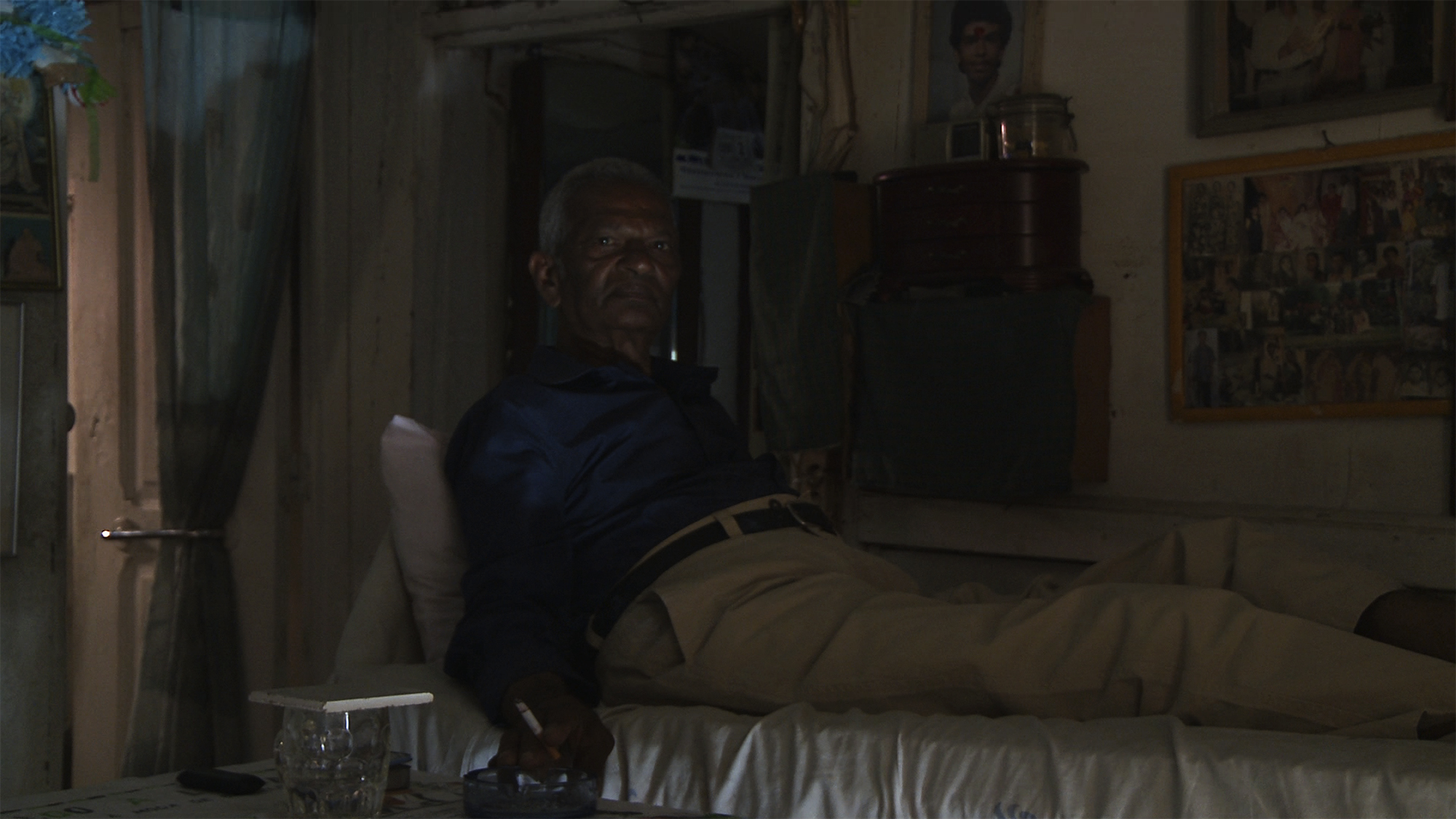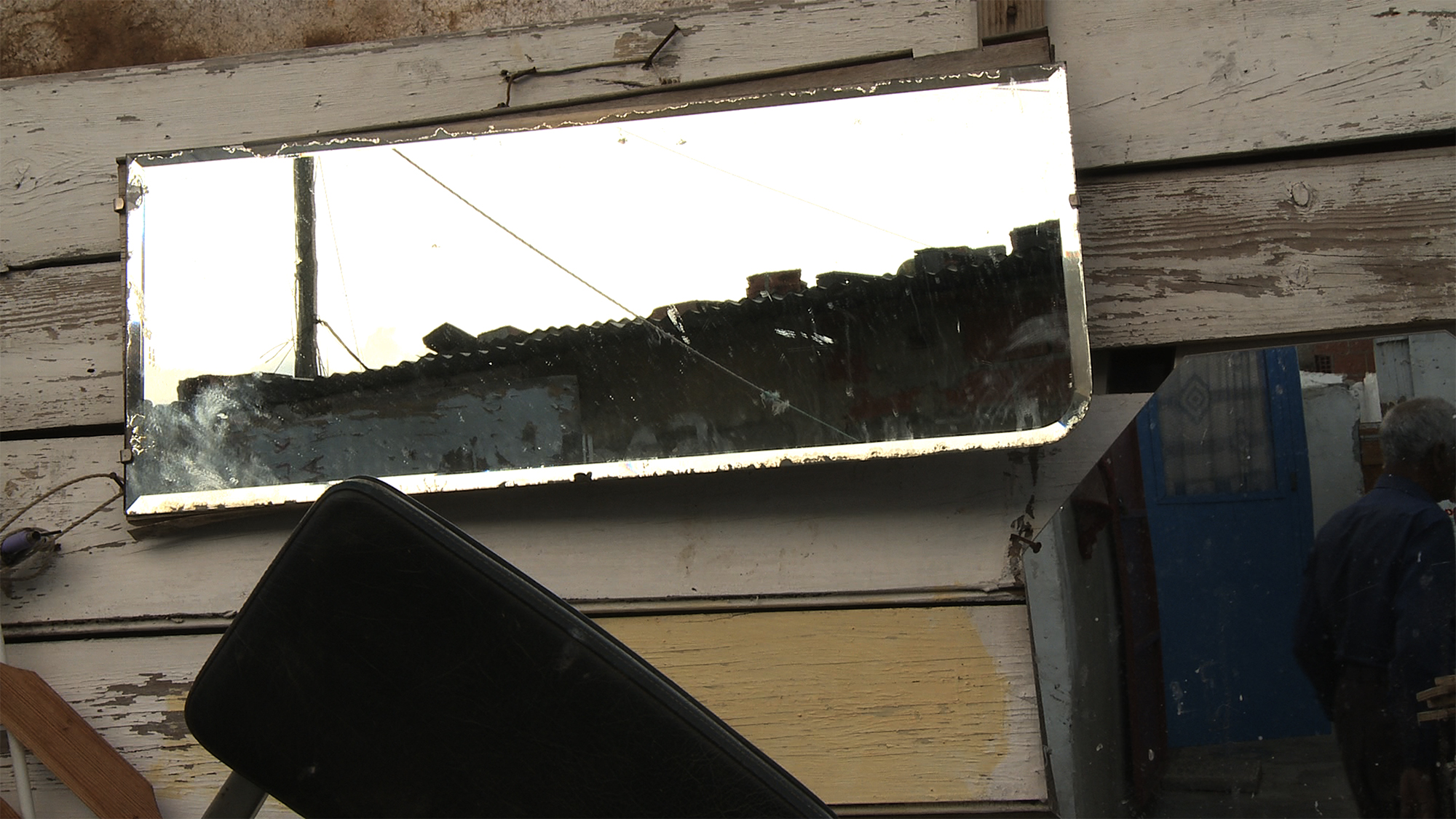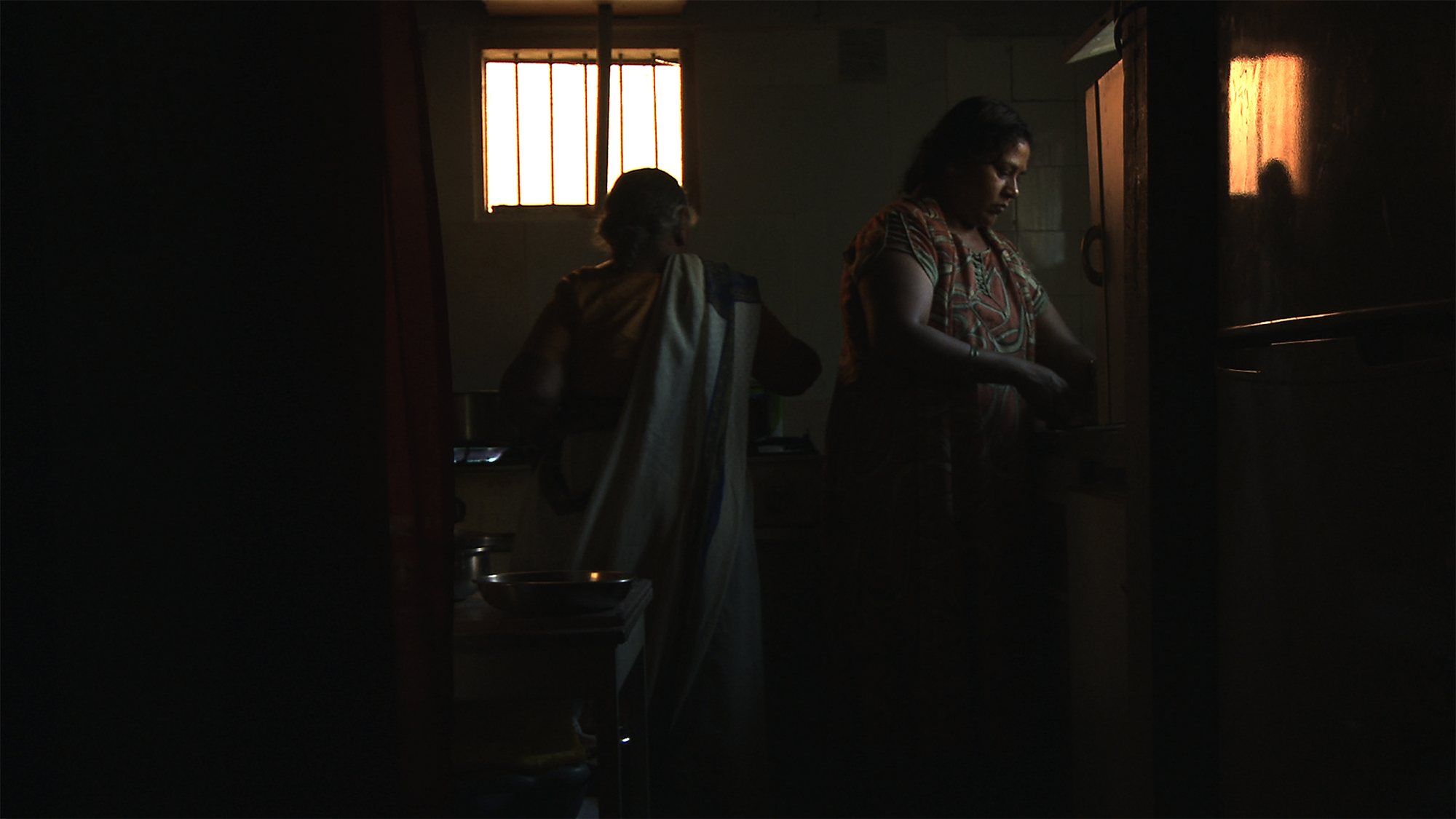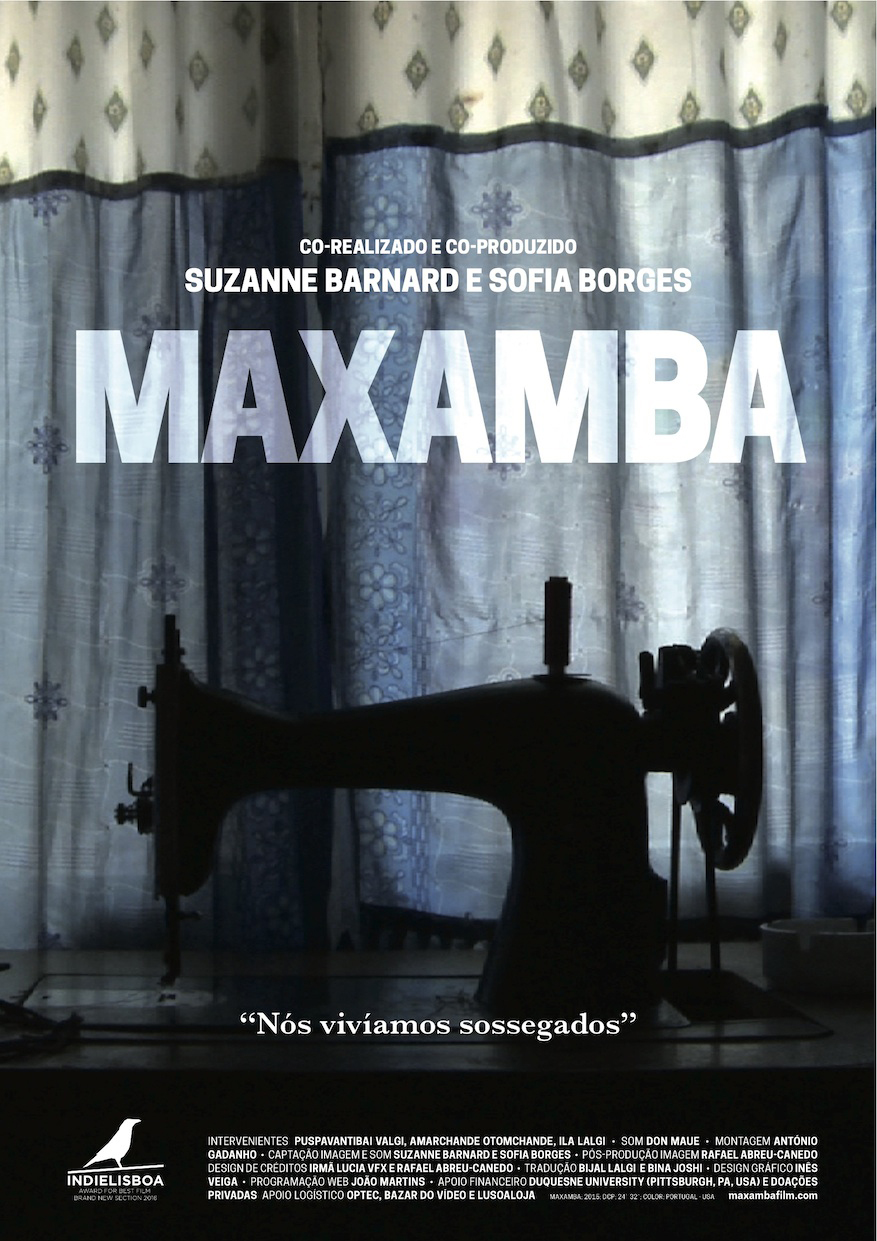MAXAMBA
The film focuses on the daily life of an Indian Portuguese couple who emigrated from Mozambique (a former colony of Portugal) to Lisbon in the 1970s.
The husband and wife both work out of their home in the neighborhood. As tailors, they have a close relationship with the other inhabitants, and they are especially integrated into the Hindu community that lives in this neighborhood. In this dialogue, Suzanne describes the film as constructing a virtual or living memory out of coexisting planes of past, present, and future—a memorial process that seeks to honor the everyday life of the couple prior to their traumatic displacement.
The husband and wife both work out of their home in the neighborhood. As tailors, they have a close relationship with the other inhabitants, and they are especially integrated into the Hindu community that lives in this neighborhood. In this dialogue, Suzanne describes the film as constructing a virtual or living memory out of coexisting planes of past, present, and future—a memorial process that seeks to honor the everyday life of the couple prior to their traumatic displacement.


Maxamba [stills] 2015
“...I would describe the film as a kind of sensory ethnographic memory, a memory of the everyday life and migrational experience of an older Indian-Portuguese couple who worked as tailors in a neighborhood under demolition on the outskirts of Lisbon. The husband, Sr. Omar, was born in India, and emigrated from Diu to Mozambique as a young man. Both Diu and Mozambique were colonized by Portugal. Sr. Omar met the woman who would become his wife whom we called Nani in Mozambique. At the beginning of the Mozambican revolution, they moved to Lisbon. At that time, Portuguese citizenship was automatically granted to persons from certain former colonies, so they carne as Portuguese citizens and settled in this neighborhood, called Quinta da Vitória (“Victory Farm/Garden”). The film’s title, MAXAMBA, can be translated as “cultivated land”—a gesture to the neighborhood’s large, communal garden and the small kitchen gar- dens where families grew plants from their cultures of origin, but also, more broadly, to the “cultivation” of culture. So, the film was a memory created in the spaces and times of their house and small yard and kitchen garden.
As the project unfolded, the memory carne to have other aspects ... the memories of their time together in Mozambique, the trip that Sr. Omar took on the boat from India to Mozambique...”.
Barnard, Suzanne; Greene, Erice; Gupta, Nisha. MAXAMBA and Memory-Making Amid Traumatic Displacement (2021). Journal of Humanistic Psychology (JHP). USA.
DIRECTORS’ STATEMENT
Our collaborative film practice recognizes that a film does not represent a simple “document” of a pre-existing reality, but that it realizes a history, an archive, through the collective and/or aggregate participation of those involved in its production. (For example, in the case of our work in Quinta da Vitória, this process engaged various participants whose cultural notions of time – “everyday time,” “life-span” and “cosmological time” – were different; among other things, these differences impacted participants’ understandings of and investments in personal memory and in narrative reconstructions of ‘past’ events.) Hence, a collaborative film practice must develop means (e. g., aesthetic, interpersonal, technological) for realizing this simultaneously improvisational, hybrid, and (potentially) temporally and historically profound process in the material reality of the film itself.
HISTORICAL CONTEXT
We began with an interest in the unique geography and history of Quinta da Vitoria, a neighborhood located in Portela, on the outskirts of Lisbon, Portugal. We became focused on the daily life of the neighborhood´s inhabitants, as well as the impact of its demolition on their lives. The neighborhood was first developed in the 1960s by persons from the interior of Portugal, and from Africa and India (many of the latter of whom were from former Portuguese colonies). In the late 90s, a significant number of immigrants again came to Quinta da Vitoria to work in the rebuilding of the eastern part of Lisbon. At that time there were about 5,000 people living in the neighborhood. In 1993, the civic government implemented the P.E.R. (Special Rehousing Plan). Although the demolition of the neighborhood began in the late 90s, it was only finally demolished in 2014. Some residents were relocated in social housing located on the outskirts of Lisbon. Residents of the neighborhood who did not live in Quinta da Vitória before 1993 were generally not offered alternative housing. Many persons in the neighborhood’s Hindu community chose to return to India or to move to England. Today the neighborhood is an empty space, marked only by some trees originally planted by the residents.

Maxamba [still] 2015
“... the film Maxamba (2016) by Suzanne Barnard and Sofia Borges, which won the Novíssimos section at the last edition of IndieLisboa, has been shooting with a careful and dazzling care the daily life of a couple of tailors of Indian origin from the Quinta da Vitória neighbourhood, which is about to be demolished. The filmmakers create a dense and heavy atmosphere, with very composed and long fixed shots and full of a warm and somewhat oppressive light, in order to fix (or at least in an attempted way) the memory of a place and people that is about to disappear.”
Ricardo Vieira Lisboa, Á Pala de Walsh
“The film “Maxamba is the continuation of a social and artistic work, which began to be developed in the neighborhood of Quinta da Vitória in 2006, with the inhabitants and a team of artists and anthropologists. The film is a moment in a larger plan. One of the first projects was the creation of a map of the neighborhood, because the neighborhood was going to be demolished. It grew from this idea and with the participation and involvement of the inhabitants. There were two exhibitions, a public intervention, and the final project was the construction of a public garden...”
Ana Tomás, Delas

Year 2015
DCP; 24' 32''; colour; stereo; Portugal-USA
Co-Directed and Co-Produced Suzanne Barnard and Sofia Borges
Cast
Puspavantibai Valgi
Amarchande Otomchande
Ila Lalgi
Cinematography Suzanne Barnard and Sofia Borges
Editing António Gadanho
Sound Don Maue
Translation Bina Achoca
Post-production picture Rafael Abreu-Canedo
Graphic Design Inês Veiga
Financial Support
Duquesne University (Pittsburgh, PA, USA) and private donations
AWARDS AND NOMINATIONS
2017. Best Short Documentary-Jury. 6th Mumbai Shorts Film Festival (India)
2017. Nomination for Cinematography Award, Annual Copenhagen Film Festival (Denmark)
2016. Brand New Prize. IndieLisboa: Festival Internacional de Lisboa (Portugal)
2016. Portuguese Production Prize. XII Extremadoc I Festival de Cinema Documental (Spain)
2016. Special Award for Best Short Documentary. Myart Film Festival (Italy)
FILM FESTIVALS (short selection)
2017. Annual Copenhagen Film Festival 2017 (Denmark)
2017. International Film Festival of São Tomé (São Tomé e Príncipe)
2017. MiradaDocs. Tenerife (Spain)
2017. Annual Copenhagen Film Festival 2017 (Denmark)
2017. Västerås Film Festival (Sweden)
2017. Pune International Film Festival (India)
2017. The Duquesne University McAnulty College and Graduate School of Liberal Arts (USA)
2017. ARKIPEL (Indonesia)
2016. IndieLisboa: Festival Internacional de Lisboa (Portugal)
2016. Silk Screen Asian Film Festival (USA)
2016. Olhares do Mediterranêo- cinema no feminino (Portugal)
2016. CineMigrante Film Festival (Argentina)
2016. XII Extremadoc I Festival de Cinema Documental (Spain)
2016. Myart Film Festival (Italy)